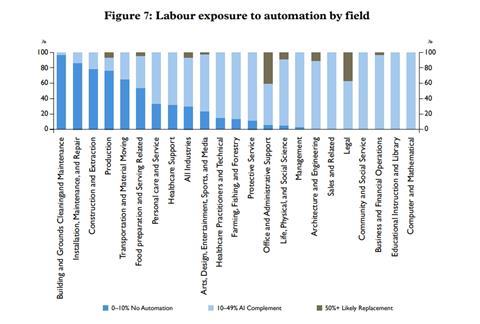Lords report downplays new tech’s potential to disrupt labour market
Artificial Intelligence will not cause widespread unemployment and is unlikely to cause much disruption at all in physical and interpersonal sectors like construction.
The House of Lords’ Communications and Digital Committee published its report into the government’s AI strategy on Friday, in which it dismissed the risk of a “robot apocalypse” and encouraged the government to embrace the technology.

“Much of our evidence suggested initial disruption would give way to enhanced productivity,” the report said. “We did not find plausible evidence of imminent widespread AI‑induced unemployment.”
It cited recent research by Goldman Sachs, which looked at how different fields would be affected.
>> The stakes are high – so are the rewards: AI and the future of construction
>> Way to go – still scratching the surface of AI
>> Top 150 Consultants 2023: How will AI help your business?
The three least affected categories were building and grounds cleaning and maintenance; installation, maintenance and repair; and construction and extraction.
Each was seen as unlikely to have workloads replaced by AI and as experiencing less than 30% of workloads completed with the support of AI tools.
“Some studies suggest jobs involving physical or interpersonal work are unlikely to experience much disruption,” the Lords report said. Architecture and engineering, as well as legal services, will be affected much more.

More broadly, the report warned that the government’s approach to AI and large language models was too focused “on a narrow view of AI safety” and said there was a “real and growing” risk of regulatory capture.
It suggested the government introduce measures to boost opportunities, address risks and support effective regulatory oversight, including to ensure open competition and avoid market dominance by established technology giants.


























No comments yet